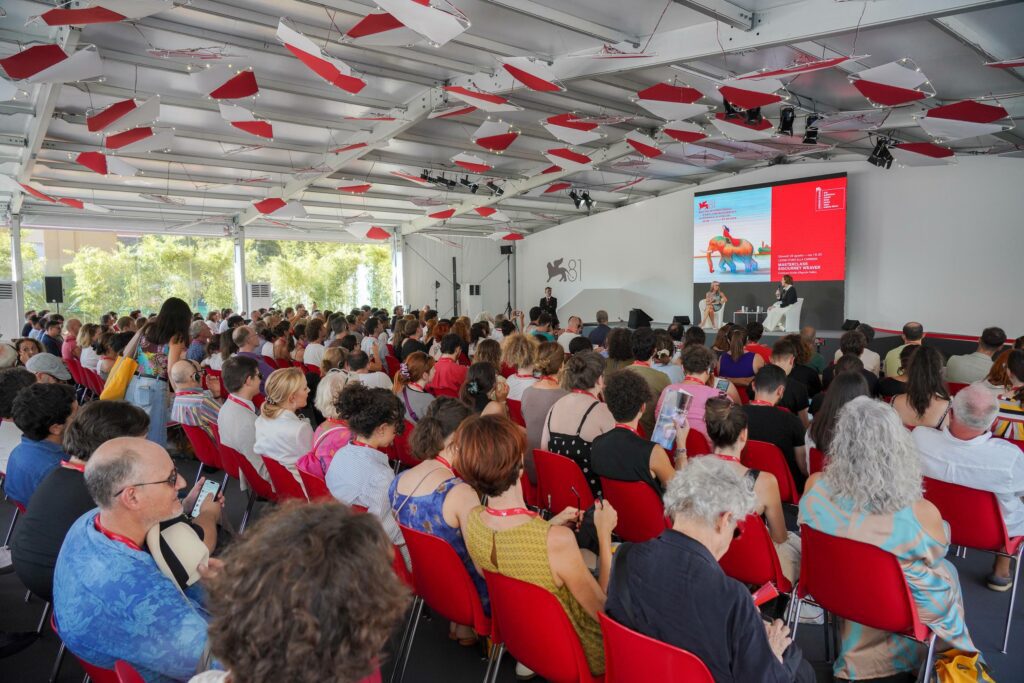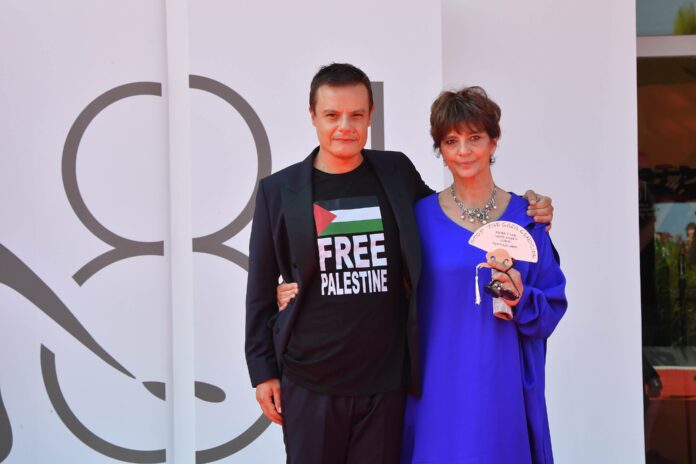ON THIS PAGE:
- Sergio Rubini: “Il mio Leopardi, vitale e senza gobba”
- Alla Mostra riflettori sulla Palestina in fiamme
- Prime analisi del mercato cinematografico italiano
- La Masterclass di Sigourney fa il pieno
Sergio Rubini: “My Leopardi, vital and without a hump.”
Spasmodic love towards life moves the existence of Leopardi – Il poeta dell’infinito, Sergio Rubini‘s miniseries on Giacomo Leopardi, presented yesterday Out of Competition, starring Leonardo Maltese (Leopardi), Cristiano Caccamo (Antonio Ranieri), Giusy Buscemi (Countess Targioni Tozzetti), Valentina Cervi (mother Adelaide Antici), Alessio Boni (father Monaldo), Alessandro Preziosi (Don Carmine) and Fausto Russo Alesi (Pietro Giordani). We will see it on Raiuno on December 16 and 17.
The Ibc Movie, Rai Fiction and Rai Com co-production retraces the life of one of the key figures of our literature by stripping him of his physical deformity, the hump, to restore the portrait of a man who seeks happiness with all too much passion, ending up taking refuge in his pessimism, in which young people still recognize themselves today. “I tell the story of the multifaceted intellectual,” explains the director, who proposes a narrative far removed from Mario Martone’s Il giovane favoloso, ”the unscrupulous, free-thinking man, different from the one we knew at school. I wanted to focus on his intellectual rather than physical morphology, hence the choice to represent him without a hump. To tell his story beyond the Operette morali, as an existentialist, avant-garde poet, I allowed myself chronological licenses, taking inspiration from Amadeus, in which Milos Forman recounts a meeting, which never happened in reality, between Mozart and Salieri.” Rubini also revealed that he had been thinking about this project for 25 years.
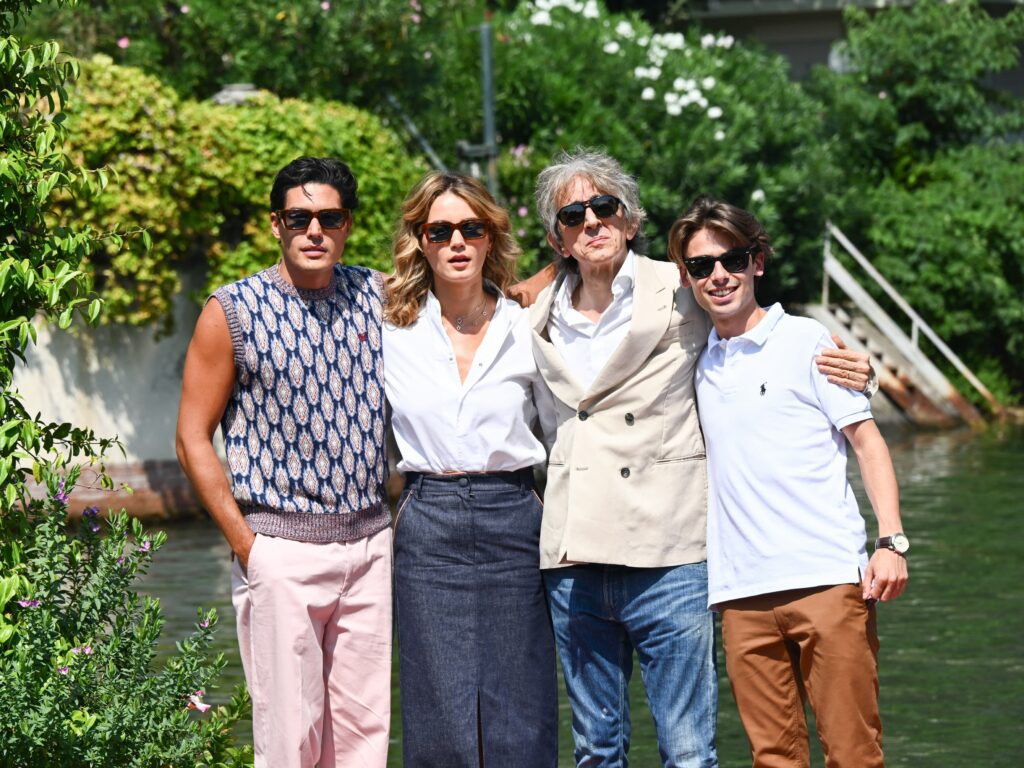
“Leopardi,” stressed Maria Pia Ammirati, Rai Fiction director and successful writer, ”is the poet of dissent, of rupture, always new. He retained a profoundly vital soul, as emerges in the series, in contrast to the stereotype of the sad, sick and closed-in poet we are used to. He asked the questions of all adolescents – who are we? where are we going? – that consecrate him as a literary spokesman for teenagers.”
Di Alessandra Farro
At the Venice Film Festival spotlight on Palestine in flames
The start of the new Israeli military offensive, this time in the occupied West Bank, reminded even the most distracted that while stars, spectators and headlines flock to the Lido, in the Middle East people continue to die in one of the most serious crises in recent history. On which this year’s Venice Film Festival reflects from various angles: at the pre-opening of Venice Days, writer Tahar Ben Jelloun, who had condemned the Oct. 7 Hamas bombings, called what has been going on for more than 10 months in Gaza under Israeli bombs “genocide.” Facts echoed in Dani Rosenberg’s doc Of Dogs and Men in competition at Horizons, where there is also Happy Holidays by Palestinian director Scandar Copti. A glimpse into the past that can help us understand how it came to this point is then offered, just today, by Göran Hugo Olsson’s Israel Palestine On Swedish Tv 1958-1989, about thirty years of conflict as seen on Swedish public TV, and September 5 (by Tim Fehlbaum, Horizons Extra), which re-enacts the 1972 Munich Olympics massacre. It is, in short, a Venice where the question Why War resonates, which, right from the title of his out-of-competition film, is posed by the pacifist voice of Amos Gitai. And where stars, including Italian ones, take sides: Lino Musella and Laura Morante paraded on the red carpet wearing, respectively, a T-shirt saying “Free Palestine” and a fan calling for “Stop the Gaza Genocide,” with the figures: more than 40,000 victims including more than 16,000 children. At Venice 81, in short, it did not happen that cinema remained indifferent, in its bubble, while outside the world burns.
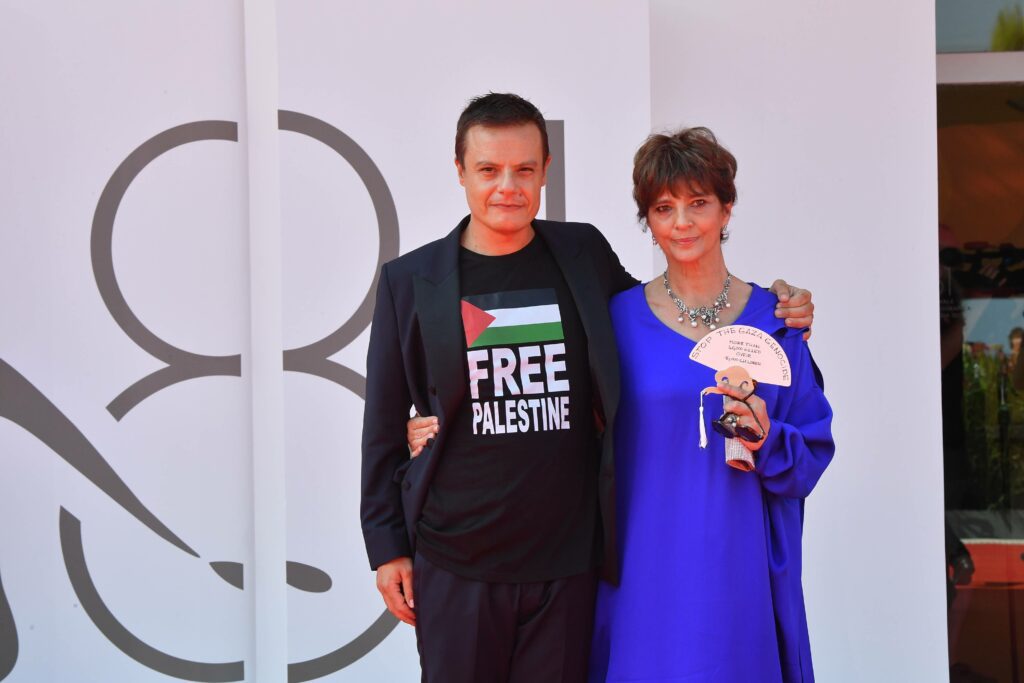
First analysis of the Italian film market
Yesterday, there was a double meeting at the Italian Pavilion, in the presence of the Undersecretary of State for Culture, Sen. Lucia Borgonzoni, on the results of Cinema Revolution and The Numbers of Italian Cinema and Audiovisual 2023.
In the morning, after a greeting from Deputy Prime Minister Matteo Salvini, Borgonzoni, accompanied by Chiara Sbarigia, President of Cinecittà, Nicola Borrelli, Director of the General Directorate for Cinema and Audiovisual and Simone Gialdini, CEO of Cinetel, emphasised that “investing in the “Cinema Revolution” initiative has been a winning move again. The audience is responding enthusiastically to the second edition of the campaign, and the excellent results recorded since June tell of a spectacular summer of 2024. I want to thank all those who believed in the project, thus supporting the cinemas and the development of the film industry.
The 2024 edition (which recorded the best month of June ever at the box office) surpassed the results of the past one with +13.4% in the box office and +8.8% in admissions over 2023, which become respectively +70.2% and +50.8% over the average of the three-year period 2017-2019. Cinema Revolution – What a summer’s entertainment, held from 14 June to 14 September with tickets for Italian and European films at the special price of 3.50 euro and opened with the Cinema in Festa days (from 9 June to 13 June), which will return from 15 September to 19 September, with the price of 3.50 euro applied to all films, including US blockbusters. Given these results, Lucia Borgonzoni announced that the initiative will have its third edition in 2025.
In the afternoon, Lucia Borgonzoni, Nicola Borrelli, and Bruno Zambardino of the General Directorate for Cinema and Audiovisual analysed the numbers of Italian cinema and audiovisual in 2023. The number of audiovisual and web works and films produced increased, as did the number of women directors of feature films and documentaries.
‘The report confirms the impetuous trend that has characterised production volumes in recent years, driven largely by public resources and in particular by tax credit,’ said Borrelli. ‘Suffice it to mention the record figure of over 1.5 billion euros for the overall budget of cinematographic and audiovisual works, or the 557 million euros of investments generated by the tax credit for attracting foreign investments for films and TV series. Borgonzoni concludes that these are ‘important numbers because, starting from their analysis, it will be easier to understand the motivations that led to the revision of the law developed together with the cinema industry’s operators’.
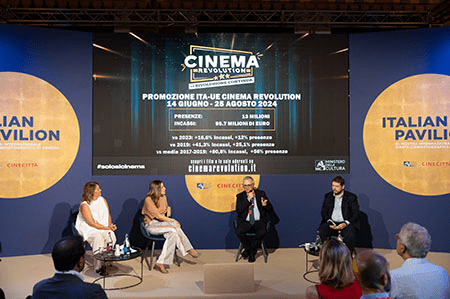
ìDi Oscar Cosulich
Sigourney’s Masterclass packs a punch
The Festival’s first Masterclass, dedicated to Golden Lion winner Sigourney Weaver, was a success both in terms of attendance and content expressed. A crowd of accredited people of all ages, but especially young people, crowded the new 250-seat Match Point Arena in front of the Excelsior, which opened with a standing ovation from the audience and a greeting to Weaver from Biennale President Pietrangelo Buttafuoco. “My height,” Weaver said among other things, ”made my life difficult at first, but in the work it protected me: A tall woman is chosen by structured and confident men. The meeting was the first in a series, which will add to the content of Venice 81.
